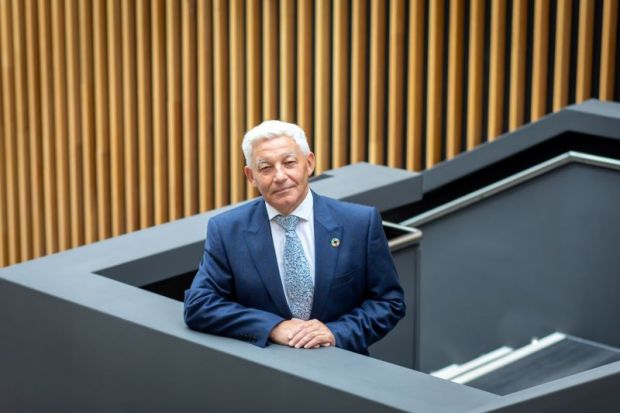Over the course of a near-40-year career, James Miller has amassed what he calls a “large archive” (his wife describes it as hoarding).
He dipped into this personal collection recently as he moved from Glasgow Caledonian University to take up his new post as the University of the West of Scotland’s principal, unearthing an old note handed to him by a patient when he worked as a clinical nurse in Edinburgh’s hospitals.
On it was written the message “I’ve written down your name because yours is the only name I knew”, a reminder, according to Professor Miller, of the need to get the basics right – something he sees as just as relevant in higher education as it is in his former career.
Professor Miller said the “wet behind the ears” young trainee would never have envisaged becoming the first nurse to run a Scottish university but can now trace how his own, slightly unconventional, career has handed him the transferable skills to do the job.
THE Campus resource: Universities must do better at bridging the gap between diversity and belonging
A diversity of experience among the sector’s top leaders can only be a good thing, Professor Miller said, but it should not be seen as a one-way revolving door.
“Whether you are talking about people coming into higher education or people from higher education going into other sectors like healthcare, [school] education or law, everybody benefits from that experience. I don’t see it as a one-way route of traffic; there are many skills and experiences that everybody will benefit from.”
Coming out of his initial nursing training, Professor Miller undertook a post-registration degree at what was then Dundee Institute of Technology, now Abertay University, before pursing an MBA at Edinburgh Napier University and a PhD in medical legal issues and patient safety at the University of Edinburgh, all alongside his work in the NHS.
As such, Professor Miller has never been a full-time student and straddling both worlds allowed him to immediately apply the theory of what he was learning to real-world settings. Forming these links between education and the outside world is still a driving factor for him today.
“Universities should not be considered as a sector sitting in some silo and only every few years we come along and ask for a bit more money,” he said.
“What I want is for us to be recognised as contributing to all aspects of the life of a nation: educationally, providing skills, contributing to economic well-being and cultural development. We’re not a sector that sits in splendid isolation. We are the foundation from which all these things can grow.”
Life came full circle recently for Professor Miller when he attended his first graduation ceremony in his new role, with the majority of students celebrating completing their own nursing degrees.
He has also seen first-hand the university’s work in artificial intelligence and how it can speed up diagnostics in respiratory disorders to help the health service reduce pressures over winter.
Ensuring research has a real impact in the world, and building on existing expertise, are the areas Professor Miller hopes to build upon in his institution’s new research strategy, but, at the same time, he seeks to remain realistic about where staff are best placed to make a difference.
“Inevitably we must think about whether an area is one we can excel in or if there is somebody else who can do it better than we can,” he said. “That is not an admission of failure but a recognition there are certain things we will not be as good at as other people.”
This approach applies to the teaching and learning side, too, with Professor Miller planning to build on areas where the university has been successful in recent years, such as widening participation.
Here, he thinks, universities need to form better links with schools. “For many of these students, just like me, they will be the first in their family to have a university experience,” he said.
“They may not have a role model to see what this looks and feels like. So, how can we, as a university, think about education as a single system and begin to talk to students at the earlier stage?…This is what I really want to do.”
While he feels that the Scottish government has a very different philosophical view towards higher education than the one adopted by some MPs in Westminster due to its policy of no fees for Scottish students, Professor Miller said attacks by those in power on the sector were a symptom of higher education being seen as disconnected.
“Some politicians view university in a binary way: you either go or you don’t,” he said. “Whereas they need to think about how universities contribute to the wider world. If they were to look at higher education and universities [as] being a foundation for economic, cultural and societal growth, they might see it in a different way.”
POSTSCRIPT:
Print headline: From nurse to v-c: how diversity at upper levels helps HE escape silos
Register to continue
Why register?
- Registration is free and only takes a moment
- Once registered, you can read 3 articles a month
- Sign up for our newsletter
Subscribe
Or subscribe for unlimited access to:
- Unlimited access to news, views, insights & reviews
- Digital editions
- Digital access to THE’s university and college rankings analysis
Already registered or a current subscriber? Login








